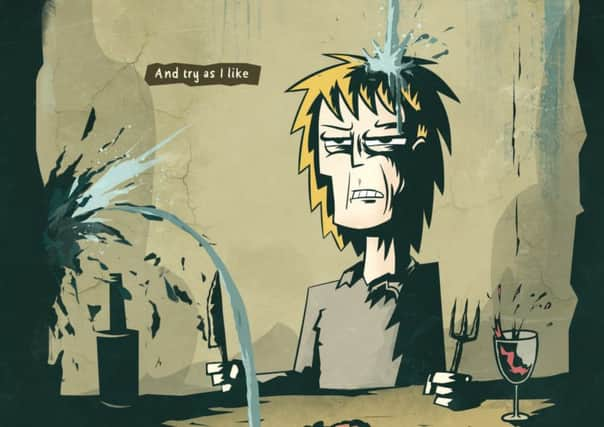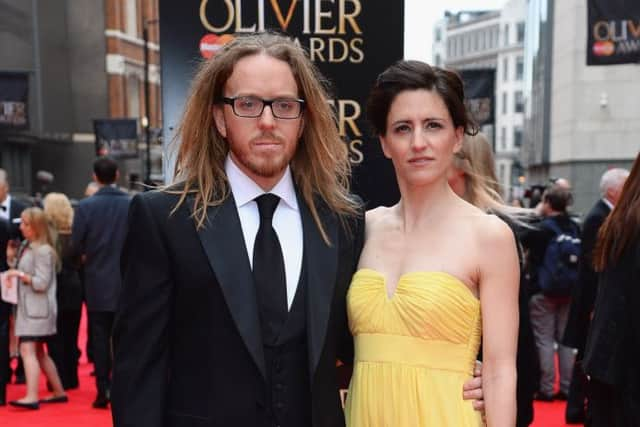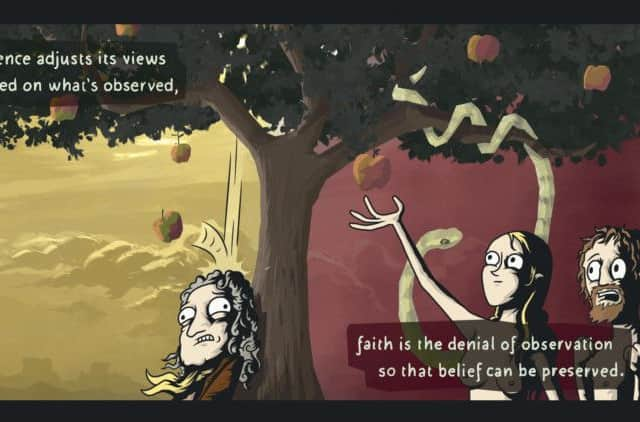Tim Minchin explores his comic book alter ego


WE’VE all been to dinner parties or down the pub where a discussion goes awry and things kick off. Later we will return to it in our minds and think through the things we wished we’d said, eloquent put-downs and reasoned arguments that see us crushing our opponents with our verbal dexterity. Australian musical satirist and piano polemicist Tim Minchin went one step further and turned his dinner party debate into a beat poem which has become an international hit. That poem became a YouTube phenomenon, then an animation, and now it’s taken on yet another life as a graphic book with a foreword by Neil Gaiman.
Storm was inspired by a North London dinner party that Minchin was invited to with his wife Sarah, where they encountered a New Age hippie. A big fan of homeopathy, she spouted her opinions “like a sniper using bollocks for ammunition”, saying things like “science falls into a hole when it tries to explain the nature of the soul”. Minchin, a humanist, rationalist, atheist fan of Richard Dawkins, was provoked into putting the case against her views, but ultimately let the hippie off the hook rather than spoil the evening. Storm is the version of events where he says the things he wishes he’d said.
Advertisement
Hide AdA ten-minute beat poem about alternative medicine and how homeopathy is so much hokum doesn’t sound like a sure-fire hit, but as soon as Minchin began performing Storm in 2009, he touched a nerve with audiences and it became an anthem for rationalism. It was the song with which the musical comedian finished his shows for two years.


In the audience one night were illustrator and animator DC Turner and producer and writer Tracy King, a writer working to popularise rationalism and science. After the show they contacted Minchin, who gave them permission to make an animated short film of his song which has now had more than three million YouTube hits and was longlisted for an animated short film Bafta.
“I’m so glad this poem has been made into a book. Now I can literally hit people over the head with my opinions,” he says.
Among Storm’s many fans are Jonathan Ross’s wife, the screenwriter Jane Goldman, who called him a prophet and a poet, while Professor Brian Cox said: “Storm perfectly captures the twisted, disfigured sack of pity and incomprehension my face becomes when attempting to present facts to the irrational.”
“I love performing the poem,” Minchin says. “It’s always in my head, but I love the book. It’s a unique artefact. A graphic novel that’s a rhyming poem about rationalism. I love it because it’s something I created and it’s been taken out of my hands and made into something new. What Tracy and Dan have done is incredible.”


Given that the hippie doesn’t get to think through and polish up her own arguments, isn’t Storm, with her belief in alternative medicine, an easy target, I ask.
Advertisement
Hide Ad“Storm is an easy target, but my character is a prick too. Storm was a fiction. I wanted to have a bit of a rant about the humanist world view. It’s an appeal to naturalism and it resonates because it ends up in an appeal to natural beauty.”
Minchin has come up against such criticism before, but he makes no apologies for having a go at things he feels strongly about.
Advertisement
Hide Ad“Why pick on Christianity, or alternative medicine? People say, ‘What’s the harm of it?’ but it happens to be what I’m writing about.
“But I find it diabolical that when someone gets cancer, the first thing that happens is they get 100 spam emails from quacks trying to make money. Medicine is the place where I feel strongly about quacks,” says the son of a surgeon. “That might have something to do with it I suppose.
“It just feels so ethically clear that you should have to prove that something works before you sell it to people. Religion is the same. Surely you have to prove it’s not a bunch of lies before you sell it to people. If your reason for hating gays is Jesus, then you are going to have to show me Jesus. Until then I will shame you.”
The musical satirist is talking to me from Los Angeles, where he now lives with his wife, former social worker Sarah, and children Violet, 7, and Caspar, 5. His day job is working on the lyrics for a DreamWorks animated film, Larrikins, about Australian wildlife, and a stage version of Groundhog Day.
“The DreamWorks job is a singing animal movie, proper old school,” he says, then changes his mind. “No, it’s not old school, it’s anarchic. It’s an Australian road movie, talking, singing animals, funny, chaotic, iconoclastic, political, rock’n’roll, silly. It’ll take three-and-a-half years to make. We’re writing songs and directing it now. That’s why we’re in LA. We realised if I wanted to do it, if it was worth it, we had to come here.
“We were looking for an excuse to leave England, and we knew one day we would leave, and we always thought we would try and go home. So we’re halfway there now.”
Advertisement
Hide AdThese days Minchin prefers to concentrate more on the music than the comedy.
“I have been a musician since I was 17 and I was a comedian between 2005 and 2011. I have barely done comedy since, and I barely did it before,” he says.
Advertisement
Hide AdHappily settled, Minchin can’t see the family returning to Western Australia to live, despite his love of the outdoors lifestyle and the region’s endless beaches.
“My wife is from there too, and it’s good to go back a bit. We do miss it, but I don’t think we could live in Perth, so we won’t go all the way home. I don’t know what I would do there. It’s hard to have things happen in your life like what has happened to me and then just go back. It was hard enough living in London and getting to a point where I go to an awards ceremony and have Tom Stoppard come up to me, a theatre geek, and say hello. It’s very full-on; I’m very lucky. And it’s very full-on for my wife, who is incredible. You feel so connected to history in London and it was hard leaving. If we didn’t have kids, we would probably still be there. But we were looking for an excuse and the DreamWorks job and Groundhog Day was it.
“Now to have coffee with Steve Sondheim in New York… I was having dinner with Joss Whedon [creator of Buffy The Vampire Slayer] the other night and it’s so f***ing amazing. Buffy is my favourite thing ever. So to leave all this stuff behind… I could go to Perth and just compose, but I’d spend my whole time on aeroplanes.
“It would mean going back and saying, ‘F*** it, I’m going to apply for this theatre company director job and bring Perth into the international scene,’ but that’s not my mission at the moment. I want to suck stuff in from people and learn, not blow it out and teach. I’m not ready yet. Working in animation I have 100 amazing artists about me and I’m learning so much, having fun. I’m not ready to start teaching yet,” he says.
The 39-year-old musician, songwriter, actor and comedian has a grand piano’s worth of awards, six CDs, three DVDs and 730,000 followers hanging on his every Tweet. His army of fans adore his musical ability and lyrical wordsmithery which can skewer targets such as bigotry and ignorance, and handle subjects ranging from inflatable dolls and sex fetishes to his own failed rock star ambitions. His fans adore songs such as Rock And Roll Nerd, Prejudice, his ginger-anthem which also targets racism, and Woody Allen Jesus, written for Jonathan Ross’s 2011 Christmas show and which ITV pulled, fearful its comparison of Jesus to Derren Brown and a Komodo dragon would offend viewers.
“I don’t know what people want or think. It’s important they think all sorts of different things. If they agree with me, then fine,” he says.
Advertisement
Hide AdAt first it was just Minchin, his poems and a piano in the Gilded Balloon at the Edinburgh Fringe in 2005. By 2010 he was playing the Sydney Opera House and the Royal Albert Hall with the 55-piece Heritage Orchestra, which collaborates with mainstream and experimental musicians and artists. This summer he played Hyde Park. Along the way he’d created the words and music for West End and Broadway hit Matilda, the Royal Shakespeare Company’s musical version of the Roald Dahl children’s classic, narrated Shaun Tan’s Oscar-winning animation The Lost Thing, and played lead in Andrew Lloyd Webber’s Jesus Christ Superstar.
Back in 2005, when he arrived in Scotland, he’d already wowed audiences at the Melbourne International Comedy Festival, winning the directors’ award with his show Dark Side. It was seeing this show that convinced Karen Koren to invite him to Edinburgh, where he went on to win that year’s Perrier. Despite this, the Guardian gave him a one-star review. Minchin hit back by penning a song of comedic revenge against the critic, Song For Phil Daoust, which contains the lines: “Everybody sing along/lalalalala/I hope one of your family members dies.”
Advertisement
Hide AdIt’s strong stuff, but in person Minchin is a much milder version of his on-stage persona, with his shock of wispy, red, backcombed urchin hair, dark suit, frilly white shirt, bare feet and heavily kohl-rimmed eyes.
“It’s just that guy is the version of me that can get up on stage and lecture at people and sneer. He’s not very different, but that’s the costume I put on to do that job.”
So the hair isn’t just the result of a lack of care, then?
“No, it takes a lot of work to get my hair looking like this. I wash it once every two to three weeks, that’s a major part of it. And I get it straightened every six months. Otherwise it’s curly.”
And for the eyeliner? “Brand doesn’t matter as long as it’s nice and smudgy. I was an actor before and always wore make-up, but when I started doing cabaret I started wearing more foundation, mascara and eyeliner. My face goes pink because I have to say so many words in a short amount of time – it’s not a compulsion to wear it. If I don’t my face disappears. In early 2005, I started to rock it. I wanted a more rocky look for some reason. And I do so many different things, it’s nice to go back and be that guy in the eyeliner.”
Born in Northampton, England, to Australian parents who were medics, the family returned to Perth, Western Australia, when Minchin was only a few months old. After attending a private boys’ grammar school, he left the University of Western Australia with a degree in English and Theatre in 1996. He then gained an Advanced Diploma in Contemporary Music at the Western Australian Academy of Performing Arts before moving to Melbourne in 2002.
Given his musical virtuosity it seems hard to believe there was a time when his future career might have been in doubt.
Advertisement
Hide Ad“I gave up playing piano at the end of grade two or in the middle of grade three, and wasn’t really practising. My mum said, ‘If you’re not going to practise, don’t do it. Are you enjoying it?’ I said no, so she said, ‘Fine then, give it up.’ A bit later my brother Dan started playing guitar and I would figure out chords and play by ear. Then when I’d done five or six scores I went to college for two years to learn how to do it properly, learn what the dots mean – but I came out none the wiser.”
Because Minchin doesn’t read music, writing his score for Matilda or the music for the DreamWorks film is a matter of making a complex demo on which he records the piano, then vocals, then harmonies. “Then an orchestrator takes my demo and piano track and makes an underscore; then it’s written into musical charts. I just record songs. Paul McCartney couldn’t write music, most songwriters can’t write music. The discipline isn’t the key to songwriting. You need to be disciplined to get good at an instrument, but it’s not the manner in which you write it down that matters. It’s not like I’m just hearing sounds. I have a reasonable technical understanding of music. I know all the chords and how to harmonise every scale. I’m not Hendrix just feeling the sounds,” he says.
Advertisement
Hide AdWith a full-time schedule writing a film and a stage show, as well as a young family, Minchin doesn’t have a lot of time for dinner parties these days, so I ask whom he would invite to a fantasy version.
“Ian McEwan because he’s a wonderful author. But I meet so many people through my job that I don’t need to have a fantasy dinner party. For example, I just did a podcast with Amy Parish who is a bonobo [ape] expert and feminist Darwinian. She talked about observing the bonobos and how they are a matriarchal society, about evolution and feminism and social structures, and I loved talking to her. I’m very lucky because with my work I meet amazing people who are so much smarter than me, but I get to have conversations with them and reflect it back. I’m sucking in this information and finding a way to translate it into comedy,” he says. “I’m learning so much and having so much fun. I’m really, really lucky. It’s full on.”
For Minchin it’s all about ideas, information and interrogating the world in which we find ourselves. In a speech accepting his honorary degree as doctor of letters from his alma mater last year, he recalled that “a famous bon mot said opinions are like arseholes in that everyone has one – but I would argue opinions differ significantly from arseholes in that they should be constantly and thoroughly examined”.
Twitter: @JanetChristie2
• Storm by Tim Minchin with DC Turner and Tracy King is out now, published by Orion, paperback £12.99/hardback £20/ebook £6.99